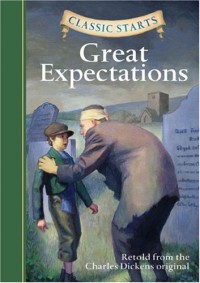Words of a Bibliophile
"It's only words, and words are all I have, to take your heart away." —Bee Gees
Great Expectations by Charles Dickens

This is possibly the oldest book in my to-read pile. My copy of it has "28 Mar 2008" scribbled on the title page, so it had been sitting on my shelf unread for over 10 years (I even found the Goodreads thread where I told a friend that I had just bought it at a discount). Finally crossing it off my list after all these years feels like a huge accomplishment.
I must say the story dragged a bit for me. Every once in a while something interesting happens but then it goes back to its plodding manner, until the third and final part of the book where things really run along. However, some details or minor characters which didn't really interest me earlier or didn't seem like they really matter turn out to be important in the end, so credit is due to Dickens for that. I also liked the comical touches which provides a nice balance to the dramatic plot and Gothic elements of the novel.
The orphan Philip Pirrip (Pip) as the central character of the book—I wouldn't call him a hero—is not exactly a sympathetic personality. He starts out innocently enough but after meeting the rich Miss Havisham and her adopted daughter Estella, he becomes ashamed of his simple country boy upbringing and of his brother-in-law/father figure, the kind but uncouth blacksmith Joe Gargery. Pip is then adopted by an anonymous patron with the promise of making him a gentleman and giving him a large inheritance. Instead of becoming more humble and using his relative prosperity to even better himself, he takes on an extravagant lifestyle and ends up accumulating debt. He can't stand Joe's unmannerly ways and basically cuts off contact with him. He also seems to have a low opinion of servants, errand boys and other people he now considers to be beneath him. Except for him reciprocating his best friend Herbert Pocket's kindness by secretly providing him with a livelihood, Pip's behavior makes it rather hard to root for him as a main character.
While Pip assumes all along that his benefactor is Miss Havisham, I had already been aware prior to starting the book that his true benefactor is the former convict Abel Magwitch, so that part didn't surprise me. What did surprise me, though, was Pip's persistence in his misguided idea that Miss Havisham as his supposed patron intends for him to marry her ward Estella, when he already knows from Herbert that Miss Havisham raised Estella to carry out revenge on all men. She even bluntly tells Estella, in Pip's presence, to break his heart. Maybe his love for Estella just makes him blind. Speaking of Miss Havisham, she is the most bizarre character with the strongest presence in the whole novel, and therefore the most interesting for me. Another favorite character of mine is a supporting one: Pip's ally Wemmick, who maintains a strict, cold demeanor at work as a lawyer's clerk but loosens up and unleashes his eccentricity at his tiny castle-like home.
Dickens is known for his improbable coincidences—which I had felt in A Tale of Two Cities—but some of the coincidental twists in this novel seem rather pointless. That Estella's birth mother is the housekeeper of the attorney Mr Jaggers, Pip's guardian, and that her father is in fact Magwitch don't seem to be very important in the grand scheme of things, since these facts are never revealed to Estella herself. Magwitch being her father also doesn't serve to endear him to Pip, as Pip's opinion of his true benefactor has already softened before he finds out about this. Magwitch's archenemy Compeyson being Miss Havisham former lover who scammed and jilted her years earlier is another revelation which doesn't go anywhere, since Miss Havisham never finds out about it and their relationship happened before Magwitch met Compeyson, so the former had no part in ruining Miss Havisham's life. It just felt like some the coincidences are purely for the shock factor and in order to have the characters connected in some way.
Despite his shortcomings Pip redeems himself near the end, as he comes to appreciate how much Magwitch has done for him and realize how badly he has behaved towards Joe and Biddy, his faithful childhood friend. The most delicious twist in the book happens when Pip, who has given up on Estella and intends to go and propose to Biddy, assuming she has been waiting for him all these years, returns home only to find that Joe and Biddy have just married. It's what Pip deserves, really.
The ending has him reunited with Estella, now a widow after having been ill-treated by her late husband, but it remains vague whether he and Estella truly end up together. Dickens actually wrote that ending after revising the original one, where they meet again after Estella has remarried and there seems to be no hope of them being together. In my opinion there has never been any romance between them to begin with as Pip's sentiments are entirely one-sided throughout the novel, and any feelings Estella might have developed are more likely to be regret borne from her suffering rather than love. But it's left to each reader's imagination whether they will end up together or it is just another one of Pip's great expectations which doesn't turn into reality.


